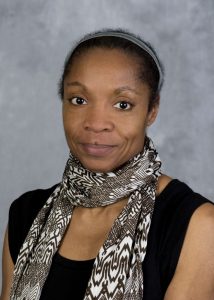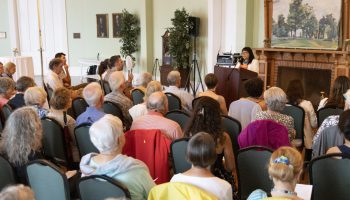Persistence.
In short, that’s what Allison Joseph wants to instill in her virtual lecture audience: persistence in writing, despite any and all of the obstacles blocking your path.

“Those challenges can be having lost somebody important to you, or not feeling that you measure up as someone who has chosen the creative life,” said Joseph, an author, director of the MFA Program in Creative Writing at Southern Illinois University and the Week Six poet-in-residence at the Chautauqua Writers’ Center.
Of late, one of Joseph’s biggest challenges to her writing is the Internet.
“I have a bad habit of being online all day, and finding the scariest stories and reposting them on social media,” she said. “The term that I’ve come across for what I’ve been doing is ‘doomscrolling.’ You go on your Facebook, your Twitter, and you find the most terrible stories about what’s happening, and it’s all true. But people are like, ‘Step away from your phone, step away from your laptop, go do something fun.’”
At 12:30 p.m. EDT Tuesday, Aug. 4, on the CHQ Assembly Virtual Porch, Joseph will elaborate on the value of persistence as it relates to writers, especially those attempting to hone their craft amid the ongoing coronavirus pandemic. Joseph is the author of several poetry collections, including Confessions of a Barefaced Woman, Worldly Pleasures and What Keeps Us Here.
Joseph is also leading a five-day poetry workshop on the CHQ Assembly Online Classroom titled “Elegy and Anti-Elegy,” which deals more specifically with writing through grief and bereavement.
“When I’ve taught at my classes at Southern Illinois University or at other writers’ conferences or workshops, I’ve always filled in time for people to actually do writing,” she said. “I’m really into people writing together. Writing is such a solitary act — it’s just you and the page, or you and the computer screen.”
That sense of community is something Joseph wants to bring to her virtual workshop, despite the obvious difficulties of creating a social atmosphere with a screen full of Zoom portraits.
“That’s how everything feels right now — if it’s not devastatingly painful, like the funeral we had for John Lewis, then there’s a distinct feeling of being off,” she said. “People in various situations have not been able to cope with how off things are. You hear all these stories of people losing it in retail situations because they were asked to wear a mask.”
But Joseph believes there’s more to those viral blowouts than meets the eye.
“Your first reaction to seeing those things is, ‘Oh, that’s an awful person,’” she said. “But think about it a little bit: it’s because we’ve all been thrown off what our normal plans or routines are, and we want desperately to get back to those.”
Joseph, a long-distance runner, can empathize with that ennui: All of her upcoming 5K races have been canceled due to the pandemic.
“We’re all sort of deeply sad, but not acknowledging that sadness,” she said. “And that’s what I want to talk about, because writing an elegy is acknowledging that sadness, acknowledging that your life is not what it was and that it won’t be going back to normal.”
That acknowledgment is something Joseph said she’s intimately familiar with — her husband of 27 years died just 10 months ago.
“Being married to him was a big chunk of my life,” she said. “I’ve heard a lot of advice like, ‘After a year you’ll move on and things will go back to normal.’ But I feel resistance to that. It’ll be different, but it won’t be the normal I knew when I was living with him. Those are some of the things I hope I get a chance to talk about.”




